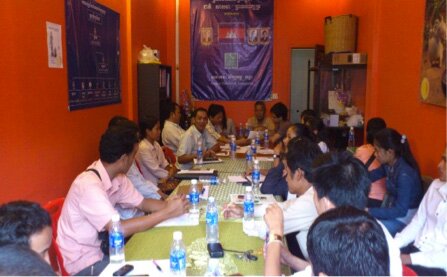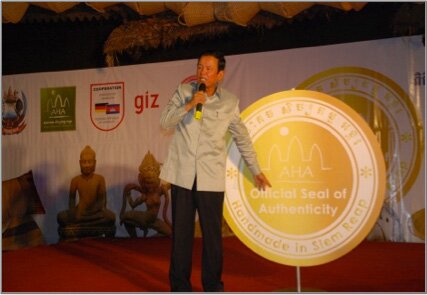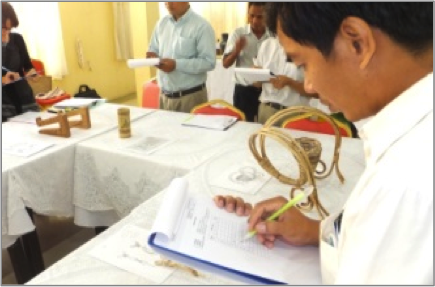
May 2013
Siem Reap, Cambodia – GIZ’s Regional Economic Development (RED) Green Belt Programme supports private and public sector partners in Siem Reap to strengthen the handicraft sector and improve the competitiveness of handicraft producers, particularly in rural areas.
In Siem Reap, handicraft production significantly contributes to the economic development of rural areas due to a winning combination of tourist volume and natural fiber processing industries. Today, handicraft production is one of the most important non-agricultural income opportunities in rural areas, particularly for low income and landless households.
However, most local producers face serious difficulties making full-use of their product’s potentials. Often, they struggle to enter national and international markets. The existence of basic business development services, an important precondition for improving the competitiveness of handicraft producers, is currently underdeveloped.
Angkor Handicraft Association provides essential institutional framework for handicraft entrepreneurs
 In 2011, GIZ-RED Programme, in cooperation with the Siem Reap Provincial Department of Commerce, supported handicraft enterprises establish the Angkor Handicraft Association (AHA). Today, the non-profit business association represents the Siem Reap handicraft sector in private-public forums, such as Small and Medium Enterprise Private Sector Working Group meetings in Phnom Penh, that aim to improve the business climate in the handicraft sector.
In 2011, GIZ-RED Programme, in cooperation with the Siem Reap Provincial Department of Commerce, supported handicraft enterprises establish the Angkor Handicraft Association (AHA). Today, the non-profit business association represents the Siem Reap handicraft sector in private-public forums, such as Small and Medium Enterprise Private Sector Working Group meetings in Phnom Penh, that aim to improve the business climate in the handicraft sector.
AHA also offers important business development services to its members and implements various initiatives that strengthen the competitiveness of local handicraft producers. Meanwhile, AHA has grown from 15 founding members to its present 42 members.
GIZ-RED, and its programme partners, provide advice to AHA during the planning and implementation of AHA initiatives and assist with management and steering capacities of the association through trainings and seminars.
“Seal of Authenticity” promotes locally produced handicrafts

Each year tourists visiting the Angkor Wat temples in Siem Reap spend around USD100 million on souvenirs. Most tourists prefer locally produced handicraft products. Often, tourists are unable to distinguish local souvenir products from imported items. In order to make better use of the long-standing and untapped high demand for locally produced souvenir products AHA has introduced the “Seal of Authenticity.
The Seal guarantees that artisans from Siem Reap Province made the product. At present, 32 handicraft companies are using the Seal of Authenticity.
Design Competition” fosters the development of authentic souvenirs in Siem Reap

In 2012, AHA and its supporting partners, held the “1st Siem Reap Souvenir Design Competition”. The objective of the design competition is to facilitate links between university-level Cambodian design students and the handicraft sector. These links support the strengthening of product and design development. More than 100 participants developed souvenir designs in 5 different categories.
As 2012’s competition was a success, AHA is currently preparing for this year’s.
Providing market access for local handicraft producers – The Siem Reap Handicraft Trade Center and the AHA Souvenir Market
 The recently opened Siem Reap Handicraft Trade Centre displays locally produced handicraft products from all handicraft sub-sectors in the area. The handicraft trade centre facilitates commercial connections between national and international traders and Siem Reap handicraft producers.
The recently opened Siem Reap Handicraft Trade Centre displays locally produced handicraft products from all handicraft sub-sectors in the area. The handicraft trade centre facilitates commercial connections between national and international traders and Siem Reap handicraft producers.
In addition to supporting the Siem Reap Handicraft Trade Centre, Angkor Handicraft Association (AHA) also provides trade related advice and services to Siem Reap handicraft enterprises and its national and international customers.
In 2012, AHA and its members jointly established the AHA Souvenir Market – the first and only Souvenir Market in Cambodia that displays only locally produced handicraft products. The market provides an additional trade platform for local handicraft producers, particularly for producers from rural areas who have limited access to customers.
